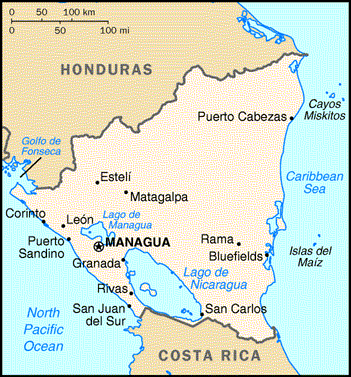

Status Quo Side: Sandinista government
Non-Status Quo Side: Contras/U.S.
Region: Western Hemisphere
Conflict Type: External Intervention
Issues in Dispute: Governance, Strategic
Having opposed the Sandinista movement throughout the 1970s, the US at first tried to maintain relations when the movement took power in July 1979 and to support progressive change within the new government. The Carter administration disapproved of the Sandinista's links with Cuba, and their opposition to capitalism and liberal democracy expressed at the UN. But all aid was not suspended until, in the administration's last days (December 1980), Washington discovered that the Nicaraguan government was supplying arms to El Salvador rebels.
In November 1981 President Ronald Reagan authorized creation of a force to interdict arms bound for El Salvador. Secretly, he also agreed to a covert war against the Sandinistas. The major beneficiary was the Nicaraguan Democratic Force (FDN), an existing band of former national guardsmen (under Gen. Anastasio Somoza) and recruits from rural nothern Nicaragua.
In March 1982 CIA-trained anti-Sandinista commandos, operating from bases in Honduras, blew up two bridges in northern Nicaragua. Seeing this as part of a larger paramilitary operation, the Sandinistas declared a state of emergency and suspended most civil liberties. By 1983 the "Contra" army comprised 15,000 well-equipped fighters. The US had imposed some economic sanctions in 1981, and a total embargo on trade began on May 1 1985 that lasted until March 1990. The US also succeeded in blocking international aid and loans. The most intense fighting occurred in 1985-86 with no conclusive results. Regional leaders who met as the Contadora Group and later became the Group of Eight, successfully negotiated the Arias Treaty in August 1987 which created a framework for peaceful settlement [see NCR].
In internationally-monitored elections on February 25, 1990, the surprise winner was the US-supported UNO coalition led by Violeta Chamorro, which took office peacefully.